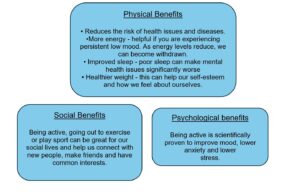Nutrition
What we put in our bodies has a huge impact on what goes on for us emotionally and so being aware of how your diet might impact on your mental health is helpful in knowing where to make changes.
Variety – It is important to eat a variety of food to make sure we get all the nutrients and vitamins that we need. Meals should have a balance of protein, healthy carbohydrates and healthy fats. If we don’t vary our diet then we can become deficient in important vitamins that help to keep us feeling healthy and happy.
Eating regularly also keeps our sugar levels steady which helps us with our energy and concentration. Unsteady blood sugars can make us feel uneasy, anxious and irritable
Regular eating – Eating 3 meals a day with one or two snacks or eating 4 or 5 smaller meals will help our brains as they need a steady and consistent flow of fuel to be able to work effectively. When we eat on an irregular basis we can struggle with poor attention/concentration, irritability and feeling low or moody. Also, by skipping meals we can end up eating too much later or not enough overall which makes our bodies struggle to understand the signals of being full or hungry.
Stay Hydrated – Not drinking enough water can make it difficult to concentrate or think clearly which are also quite common features of feeling anxious so by making sure, we have had enough water will help with this. Dehydration also causes headaches, constipation, tiredness, mood changes, cognitive (thought) impairment and memory loss.
How much should I drink?
- Most people need to drink around 2 litres of water a day which is about 8-10 glasses
- Keep in mind though that other drinks also contain water and so do a lot of fruit and vegetables!
What should I drink?
- Water
- Coconut water
- Fruit juices and smoothies (although watch out for lots of sugar!)
- Milk (Semi-Skimmed and Skimmed)
- Tea and Coffee (Yes these do count but drink in moderation as these contain caffeine)
Caffeine
Caffeine is a stimulant that affects the central nervous system, so drinks that contain caffeine stimulate the central nervous system causing the body to produce and release adrenaline. This can cause a person to feel anxious or nervous.
Sleep
There is a close relationship between sleep and emotional wellbeing. Often having issues with mood and anxiety can impact on our sleep and poor sleep can have a negative impact on our mental health and emotional wellbeing.
Sleep problems can lead to;
- Negative thoughts
- Low mood
- Anxiety
- Irritability
- Feeling withdrawn
- Irrational thoughts
- Paranoia
- Changes in diet/appetite/eating habits
Why is sleep important?
Whilst we tend to think that sleep is a time for our minds and bodies to shut down, our brains are working very hard during sleep. Sleep is a period where a lot of processing, strengthening and restoration occurs (think of it as your brain resetting!). One of the vital roles of sleep is to process our memories and all the information we have taken in throughout our day. Overnight our brains ‘sort’ pieces of information and transfer short-term memories into stronger long-term memories. Sleep also helps our bodies as during sleep our bodies restore and rejuvenate, repair tissue, grow muscle and balance hormones.
The adolescent brain
The teenage brain is a time of great change and development. Sometimes there is a misperception that this means it is a time of difficulty and challenging behaviour. While there may be some truth in this, it is only part of the story. It is also a time of opportunity and growth. The video from Dr Siegel captures how we can look at this time differently.

